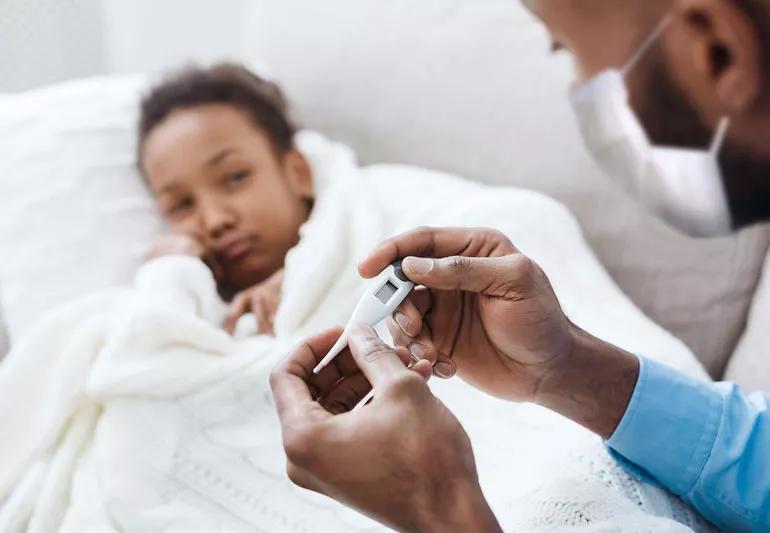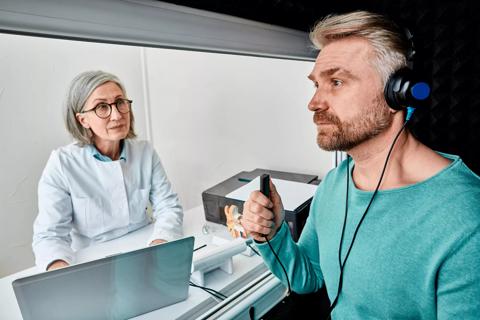Advertisement
An expert explains how long they’ll have to stay home

While the approval of the COVID-19 vaccine for children ages 5 and up has brought relief for worried parents across the country, there’s still plenty of reason for concern. As many students across the country have returned to in-person learning, cases are spreading among children.
Advertisement
Cleveland Clinic is a non-profit academic medical center. Advertising on our site helps support our mission. We do not endorse non-Cleveland Clinic products or services. Policy
Besides being worried for a child’s health, parents might also face confusion as rules vary across school districts and some even differ from the CDC’s guidance. But you can still follow a general set of guidelines for taking care of your child, doing your best to align it with your school’s recommendations.
We spoke with pediatric infectious disease expert Frank Esper, MD, to get the latest on what to do if your child tests positive for COVID-19.
Maneuvering CDC guidelines and your school’s specific rules can be tricky, Dr. Esper acknowledges. But, he adds, the CDC’s outline provides a good base of rules to follow and that parents can always choose to do more to protect their children if they feel the need.
Perhaps the most important thing is to understand the difference between quarantine and isolation, especially in regards to your school’s policy. “Quarantine is for when you’ve been exposed, but you’re not sick while isolation is for when you’re sick,” explains Dr. Esper.
If your child shows symptoms of COVID-19, they should quarantine and get tested as soon as possible, Dr. Esper recommends. If they test positive, they should be isolated to prevent potential spread through the rest of the household.
Of course, even if your child tests negative for COVID-19 after showing certain symptoms, other common childhood respiratory viruses could be responsible (influenza, RSV), which means they should stay home from school anyway.
Many schools use some form of contact tracing, sometimes in partnership with local health agencies, to alert parents when their child has been in close contact with a schoolmate who tested positive for COVID-19. So how should you proceed if your child is found to have been in close contact? It depends, says Dr. Esper.
Advertisement
“If your child was exposed and is showing symptoms, they should be quarantined and tested,” Dr. Esper says.
If your child was exposed but vaccinated, the CDC says there’s no need to quarantine. Instead, they can continue attending in-person school but should wear a mask (many schools already require masks) and get tested five to seven days after the contact.
But if your child is unvaccinated and exposed, the CDC recommends a 14-day quarantine. The CDC has options to potentially shorten that quarantine period when combined with testing but that policy may vary from school to school.
Again, the policy for when your child can return to school after testing positive for COVID-19 will vary depending on your school’s policy. Dr. Esper points out that the CDC advises staying home for a full 10 days following the onset of symptoms. If the school allows, students can return after those 10 days and a substantial improvement in symptoms.
He adds that there should be no requirement for a negative test to return because it’s possible to test positive for COVID-19 long after symptoms have passed and you are no longer contagious. “These tests, especially the PCR molecular tests, are very sensitive. They can return a positive result just because it’s detecting the remnants of an old infection,” he says.
Additionally, he says it’s not unusual for some symptoms to linger well after a person is no longer contagious. “Coughing and even the loss of taste and smell can last for weeks,” he says. “As long as there’s an overall marked improvement after 10 days, they should be okay to return to class. If there’s no improvement, their isolation should probably be extended.”
Just like with adult cases, some children with COVID-19 may experience symptoms while others may remain asymptomatic for the length of their illness. COVID-19 symptoms in children are very similar to those in adults, says Dr. Esper.
The primary symptoms to be on the lookout for include:
If your child is experiencing these symptoms, keep them home from school and consider getting them tested for COVID-19 as it can be hard for children, especially younger ones, to fully describe how they feel.
“When a child is ill, especially younger children, they don’t know how to express how they feel or their symptoms,” Dr. Esper says. “They may just say ‘I don’t feel good,’ and point to their tummy.”
As with vaccinated adults, vaccinated children can still contract COVID-19 but these breakthrough cases are generally less severe than in unvaccinated patients.
It’s important to make sure you keep your sick child hydrated just as you would with any other respiratory illness. Dehydration from vomiting or high fever can worsen the illness and cause further complications.
You can also treat fevers, headaches and general muscle aches with over-the-counter pain medications like Tylenol® or Motrin®. Just be sure to use the appropriate dosage based on your child’s age.
Advertisement
When it comes to illness, Dr. Esper says that you shouldn’t wait for a specific set of symptoms or circumstances to contact your child’s doctor. If something concerns you, reach out.
“Every person, every family is different. Whether or not to call your child’s pediatrician about an illness is up to you,” he says. “But, generally, pediatricians would rather you called than not. Your child’s health is extremely important and that’s why there are answering services set up so that they can help you determine if your child needs to see a doctor even if it’s late at night.”
As vaccinations for children ages 5 to 11 were only recently approved by the FDA, there’s not nearly as much data available on that age group as there is on adolescents between 12 and 17 and adults 18 and up.
But, Dr. Esper notes, the COVID-19 vaccines are just as effective in children as they are in adults even as the small risk of breakthrough cases remains. “We are seeing breakthrough cases with children and adolescents just as we do with adults but the vaccine still substantially prevents infection,” he says.
He adds, “Children have always been less likely to become seriously ill or require hospitalization due to COVID-19 but, so far, the data confirms that the vaccine considerably lowers those already low risks, too.”
Advertisement
Learn more about our editorial process.
Advertisement

The medication is ineffective and — in the case of animal ivermectin — potentially dangerous

Updated vaccinations are recommended to better protect against the evolving virus

Enteroviruses are often to blame for summer colds, leading to a runny nose, sore throat and digestive symptoms

Redness, swelling, itching and rash can happen when your body’s immune system reacts to the vaccine injection

Studies suggest 1 in 5 people infected with the coronavirus never develop symptoms

An increased risk of blood clots can last for nearly a year after a COVID-19 diagnosis

COVID-19 may be associated with tinnitus, but research is still ongoing

The short answer: It’s complicated, but the basic care precautions still prevail, like washing your hands and isolating if you’re sick

Focus on your body’s metabolic set point by eating healthy foods, making exercise a part of your routine and reducing stress

PFAS chemicals may make life easier — but they aren’t always so easy on the human body

While there’s little risk in trying this hair care treatment, there isn’t much science to back up the claims